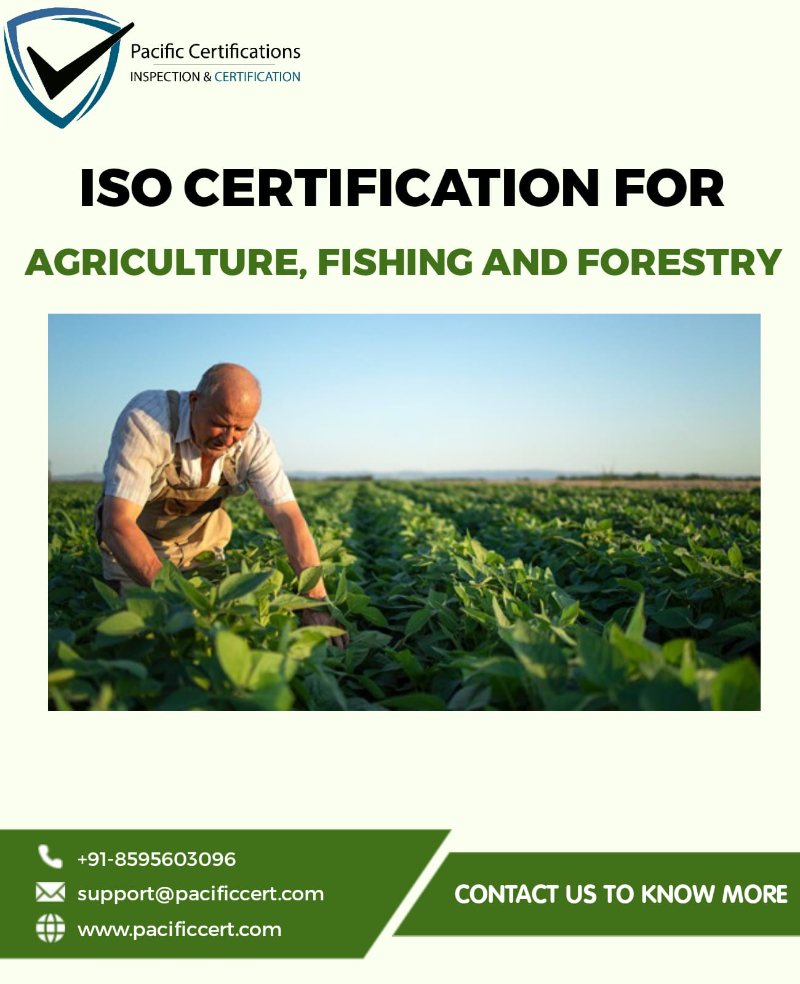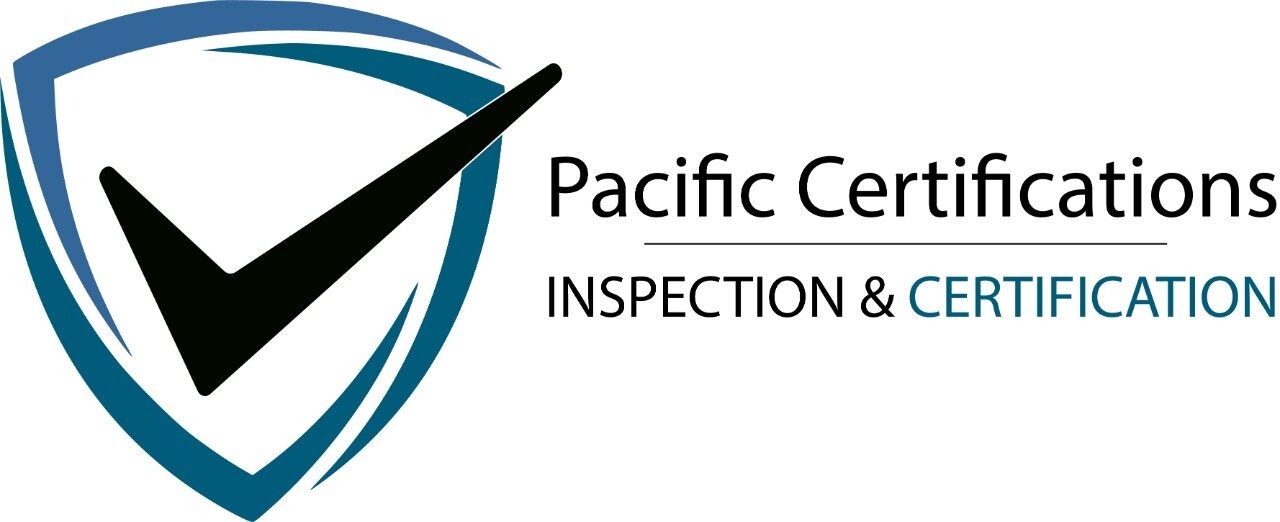ISO certifications for Agriculture, Fishing and Forestry industry

The Agriculture, Fishing, and Forestry industry is a crucial sector that involves the cultivation of crops, raising of livestock, harvesting of timber, and the capture of fish and other aquatic resources. This industry plays a significant role in providing food, raw materials, and various resources necessary for human consumption and other industries. Each year governments runs schemes to appreciate this prime industry.
Click here to see the developments and initiatives by the Government in the year 2023
Here's an overview of each component of this industry:
Agriculture: Agriculture involves the cultivation of plants for food, fiber, medicinal herbs, and other products used in various industries. This includes crops like grains (wheat, rice, corn), fruits, vegetables, oilseeds, and cash crops like cotton and tobacco. It also encompasses practices related to soil management, irrigation, pest control, and agricultural machinery usage.
Livestock Farming: Livestock farming includes raising animals for meat, dairy products, wool, leather, and other by-products. Common livestock animals include cattle, sheep, goats, pigs, poultry (chickens, ducks, turkeys), and other animals. This sector is essential for providing protein-rich food sources and other animal-derived products.
Fishing and Aquaculture: Fishing involves the capture of fish and other aquatic organisms from oceans, seas, rivers, and lakes. Aquaculture, on the other hand, is the controlled farming of fish, mollusks, crustaceans, and aquatic plants in various water environments. Both fishing and aquaculture contribute to the global seafood supply and play an essential role in food security.
Forestry: Forestry involves the management and conservation of forests for timber production, fuelwood, paper, and other forest products. Sustainable forestry practices aim to balance the economic benefits of harvesting wood with environmental conservation and ecological sustainability.
Challenges in the Agriculture, Fishing, and Forestry Industry:
Environmental Concerns: This industry faces significant challenges related to environmental sustainability, deforestation, overfishing, and the impact of agriculture on soil health and water resources.
Climate Change: Climate change poses threats to crop productivity, changes in fishing patterns, and the increasing frequency of extreme weather events.
Technological Advancements: Advancements in agricultural technology, precision farming, and aquaculture practices are essential for improving productivity and reducing resource use.
Food Security: Meeting the increasing global demand for food while ensuring equitable access to nutritious food remains a priority.
Policy and Regulation: Governments need to develop and implement policies that promote sustainable practices, protect natural resources, and support the livelihoods of farmers, fishermen, and forest communities.
Market Volatility: Fluctuations in commodity prices can impact the profitability of producers and the availability of affordable food and other products.
The Agriculture, Fishing, and Forestry industry is continually evolving to address these challenges while striving to meet the needs of a growing population sustainably. Advances in technology, research, and global cooperation are essential to create a more resilient and sustainable future for this vital sector.
ISO Certifications for Agriculture, Fishing and Forestry
ISO (International Organization for Standardization) has developed several standards applicable to the Agriculture, Fishing, and Forestry industry. These standards aim to promote best practices, quality, safety, and sustainability within the sector. Here are some ISO certifications relevant to these industries:
ISO 22000 - Food Safety Management Systems: ISO 22000 focuses on food safety management systems. It provides guidelines for organizations involved in food production, processing, and distribution to ensure the safety and quality of food products throughout the supply chain. This certification is relevant to food processing companies, fishing vessels, aquaculture operations, and other related industries
ISO 9001 - Quality Management Systems: ISO 9001 is a generic standard that applies to various industries, including agriculture, fishing, and forestry. It sets out criteria for a quality management system that can be applied to improve processes, customer satisfaction, and overall efficiency in these industries.
ISO 14001 - Environmental Management Systems: ISO 14001 focuses on environmental management systems and provides guidelines for organizations to reduce their environmental impact and promote sustainable practices. This certification is relevant to forestry companies and any organization involved in agriculture and fishing that seeks to minimize its ecological footprint.
ISO 45001 - Occupational Health and Safety Management Systems: ISO 45001 addresses occupational health and safety management systems. It provides a framework for organizations to prevent work-related injuries, illnesses, and fatalities. This certification is relevant to forestry operations, fishing vessels, and agricultural enterprises to ensure the safety and well-being of workers.
FSC (Forest Stewardship Council) Certification: FSC certification is relevant to forestry operations. The Forest Stewardship Council is an organization that sets standards for responsible forest management. Forestry companies that meet these standards can be certified, indicating that their products come from responsibly managed forests.
Overall, these certifications demonstrate an organization's commitment to quality, safety, environmental sustainability, and responsible practices within the Agriculture, Fishing, and Forestry industry. Obtaining these certifications can enhance the reputation of businesses, improve market access, and meet the demands of environmentally and socially conscious consumers.
How ISO certifications can help Agriculture, Fishing and Forestry industry
ISO certifications provide recognized standards and guidelines for organizations within these sectors to improve their practices, enhance their reputation, and meet the expectations of consumers, regulators, and other stakeholders. Here are some specific ways ISO certifications can help these industries:
Improved Quality and Safety: ISO 9001 and ISO 22000 certifications focus on quality management and food safety, respectively. By implementing these standards, organizations can establish systematic processes to ensure the quality of their products and the safety of the food they produce and distribute. This can lead to a reduced risk of contamination, product recalls, and related liabilities.
Enhanced Sustainability: ISO 14001 and FSC certifications emphasize environmental responsibility and sustainable practices. By obtaining these certifications, forestry companies can demonstrate their commitment to responsible forest management and conservation. In agriculture and fishing, ISO 14001 helps organizations minimize their environmental impact, improve resource efficiency, and promote sustainable production practices.
Increased Market Access: ISO certifications are widely recognized and respected globally. Having these certifications can open doors to new markets and customers who prioritize quality, safety, and sustainability. Many retailers and buyers prefer to work with certified suppliers, making it easier for certified businesses to access supply chains and distribution networks.
Compliance with Regulations: Adopting ISO certifications can help organizations comply with local and international regulations. For instance, ISO 22000 aligns with food safety requirements, while ISO 45001 addresses occupational health and safety standards. Meeting these standards can lead to better regulatory compliance and reduce the risk of non-compliance penalties.
Customer Confidence and Trust: ISO certifications signal a commitment to excellence and continuous improvement. Customers are more likely to trust and prefer products from certified organizations as they have confidence in the adherence to quality, safety, and sustainability standards.
Increased Efficiency and Productivity: ISO 9001's focus on quality management can lead to improved processes, reduced waste, and increased efficiency in production and distribution. This can result in cost savings and higher productivity levels.
Employee Morale and Safety: ISO 45001's emphasis on occupational health and safety can create a safer work environment, reduce accidents, and boost employee morale. Happier and healthier employees tend to be more productive and committed to their work.
Stakeholder Engagement: ISO certifications can improve relationships with stakeholders, including customers, suppliers, investors, and communities. Demonstrating a commitment to sustainability and responsible practices can enhance an organization's reputation and social standing.
ISO certifications offer a range of advantages to the Agriculture, Fishing, and Forestry industry. By obtaining these certifications and adhering to their guidelines, organizations can improve their operations, address environmental and social challenges, gain a competitive edge, and build trust with their stakeholders
Click here to apply for an ISO Certification for your organization or contact us at [email protected] or +91-8595603096

Read more: ISO certification for Funds Management Services and applicable standards
